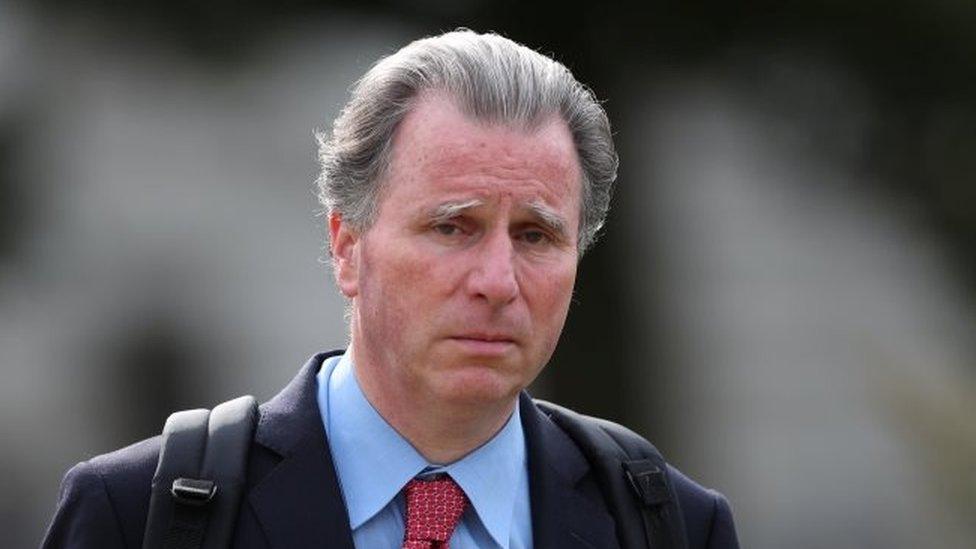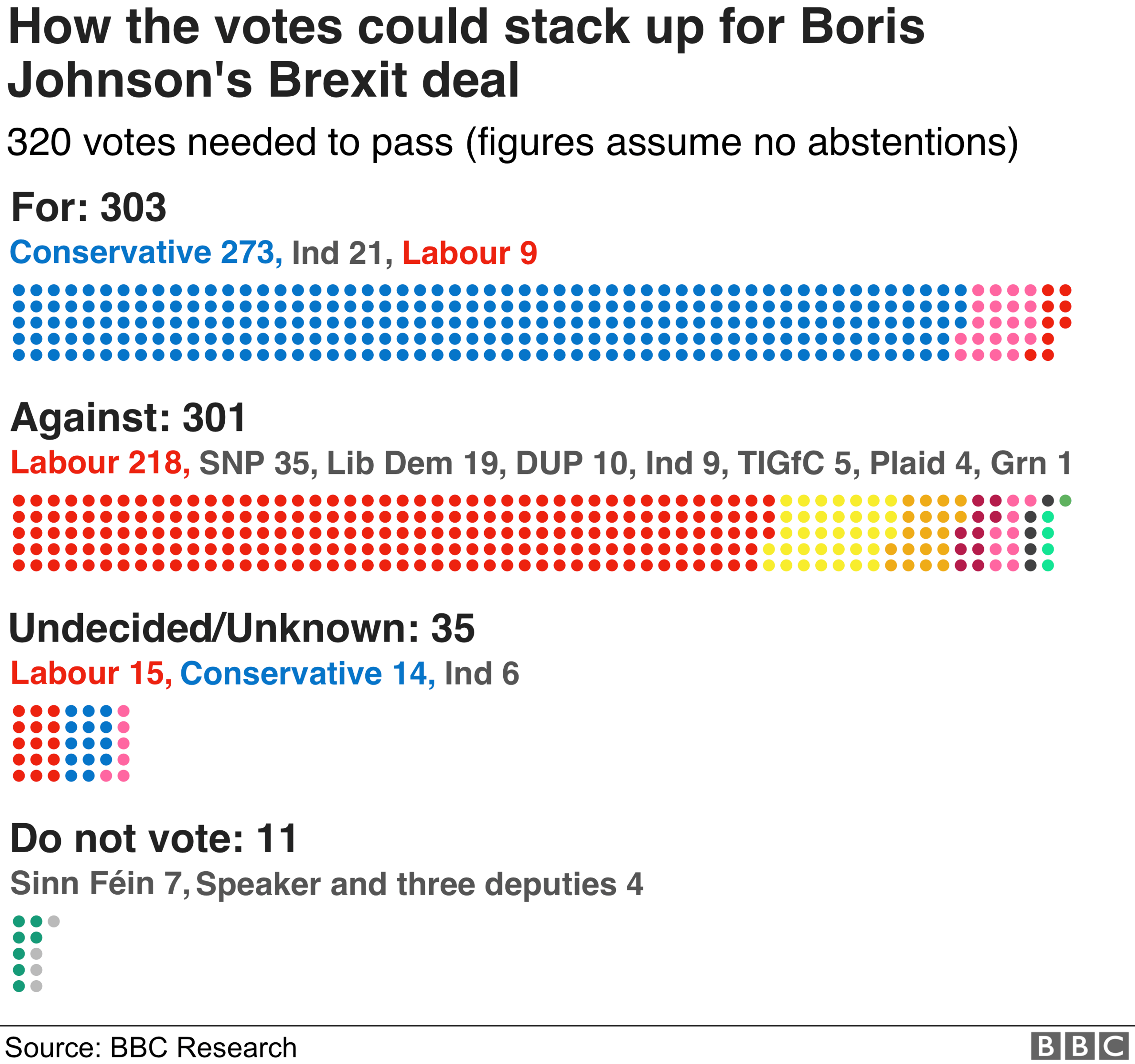Brexit: Johnson in race to win support for deal
- Published
- comments
Boris Johnson: "They will want to vote for it on Saturday"
Boris Johnson is in a race against time to sell the Brexit deal he has struck with the EU to MPs ahead of a Commons vote on Saturday.
The prime minister insists he is "very confident" of getting the majority he needs to "get Brexit done" by his 31 October deadline.
But the DUP and every opposition party plans to vote against his deal.
That means he must persuade Labour rebels, ex-Tories and Brexiteers in his own party to get on board.
A spokesman for Mr Johnson said he and and his team were spending the day on the phone to MPs from across the Commons to sell the deal.
The PM is also holding a cabinet meeting in No 10.
The DUP's Brexit spokesman, Sammy Wilson, said his party would not only vote Mr Johnson down, but urge Conservative MPs to "take a stand" with them, setting the scene for a frantic day of arm-twisting on all sides at Westminster.
Allow X content?
This article contains content provided by X. We ask for your permission before anything is loaded, as they may be using cookies and other technologies. You may want to read X’s cookie policy, external and privacy policy, external before accepting. To view this content choose ‘accept and continue’.

Labour has also attacked the deal after one Tory MP, John Baron, said the UK would be able to leave the EU "on no-deal terms" if trade talks failed come December 2020 - the so-called transition period.
The party's chairman, Ian Lavery, said: "The cat has been let out of the bag... [and] no one should be in any doubt that Johnson's deal is just seen an interim arrangement."
But Home Secretary Priti Patel urged colleagues to look at the deal as an opportunity to "start a new chapter for our country".
The prime minister will make a statement to the Commons on Saturday, before another minister opens a debate on the deal.
If he does not manage to get the numbers needed to win a vote, then he is expected to try again to trigger a general election.
The law states that the PM must ask the EU for a three month extension to the Brexit deadline if he cannot get a deal through Parliament.
The text of the letter he must send to Brussels is contained in the so-called Benn Act, passed last month by MPs determined to prevent a no-deal Brexit.
Mr Johnson has said the UK will leave on 31 October with or without a deal - but he has also said he will abide by the law.
But even if MPs vote for his deal on Saturday, he may still have to ask the EU for an extension.
Former Conservative MP Oliver Letwin has tabled an amendment that would ensure the deadline is extended until the Brexit deal had passed each step in Parliament to become law.
Sir Oliver, who is among the MPs seeking to prevent a no-deal Brexit, said he did not want to "let the government off the hook".

Analysis

By BBC Parliamentary Correspondent Mark D'Arcy
Sir Oliver's amendment is a cunningly-crafted proposition which, crucially, could be voted for by MPs who want a deal, but don't trust this one, and don't trust the government.
It rests on the idea that were Parliament to approve the deal for the purposes of the Benn Act now, there might then be a danger that the subsequent legislation to enact it might be, somehow, derailed, resulting in a no-deal exit on 31 October.
With the Benn Act out of the way, they believe that some manoeuvre, some legislative judo move, by factions inside and outside the government, who favour a "clean Brexit" could leave no time for any effective counter… and Britain would be out, with no deal.
This reflects the sheer level of distrust that has accumulated over several cycles of Brexit angst.

The SNP's Westminster leader Ian Blackford has also tabled an amendment, calling for a three month extension to Brexit to allow for an early general election.
He told the BBC the deal gives Northern Ireland a "competitive advantage", but "shafted" Scotland.
Will MPs support Boris Johnson's new Brexit deal?
Meanwhile, cabinet ministers have been touring the TV and radio studios to sell the deal.
Foreign Secretary Dominic Raab told BBC Radio 4's Today programme it was "an opportunity to get Brexit done, turn the page and move forward".
The new deal is largely the same as the one agreed by Theresa May last year - but it removes the controversial backstop clause, which critics say could have kept the UK tied indefinitely to EU customs rules.
Northern Ireland would remain in the UK's customs union under the new agreement, but there would also be customs checks on some goods passing through en route to Ireland and the EU single market.
The prime minister is expected to focus his attention on winning over three groups to support his deal:
Tory Brexiteers who have not yet backed a deal and repeatedly voted against former PM Theresa May's withdrawal agreement
Twenty-three former Tory MPs who now sit as independents, including 21 Mr Johnson kicked out of the party last month after they rebelled against him in a bid to prevent a no-deal Brexit
And a group of Labour MPs who have expressed a desire to back a deal but are concerned about protection for workers and the environment
DUP: PM 'too eager for deal at any cost'
The DUP is unhappy with the changes, claiming they are not in the best interests of Northern Ireland.
But the Northern Irish party can no longer rely on the automatic support of the the pro-Brexit European Research Group - formed of backbench Tory MPs.
Vice-chairman of the group, Mark Francois, told reporters he "still has some concerns about some of the specifics of the deal", and was meeting the prime minister "to put some questions directly to [him]."
But ERG member Andrew Bridgen told BBC Breakfast he believed the "vast majority" of the group "will come to the conclusion that this deal is tolerable and we need to get Brexit across the line".
The ERG will hold a meeting on Saturday morning to advise a position to members to take in Parliament.
Labour's shadow chancellor John McDonnell told the Today programme the deal was "worse deal than Theresa May's", adding: "We can't vote for that or let it go through".
But while Labour's focus was on defeating the government's proposals, Mr McDonnell said discussions were ongoing about a further referendum - either on Mr Johnson's deal or a "sensible deal" negotiated by Labour.
"There are discussions taking place [about] when the right time to put an amendment down is," he said. "There is a principle here to be established to let the people decide."
He also warned there would be "consequences" for MPs in his party who voted for Mr Johnson's deal.
However, on Wednesday, Labour leader Jeremy Corbyn played down the possibility of removing the party whip from any rebels.
"I believe in the power of persuasion rather than the power of threat," he said.
Labour MP Ronnie Campbell, who is standing down at the next election, said "at the moment" he would vote to support the deal.
But he told the BBC: "I am getting a lot of pressure from the head lads of the Labour Party... to abstain."

Crunching the numbers as MPs prepare for key Brexit vote
Can Boris Johnson win the vote?
The winning post for votes in the House of Commons is 320 if everyone turns up - seven Sinn Fein MPs do not sit and the Speaker and three deputies do not vote.
There are currently 287 voting Conservative MPs. The prime minister needs to limit any rebellion among them.
Then, if the DUP will not support his deal, he will need the backing of 23 former Conservative MPs who are currently independents. Most will probably support the deal, but not all.
That is still not quite enough, though, so the PM will also need the backing of some Labour MPs and ex-Labour independents. In March, when MPs voted on Theresa May's deal for the third time, five Labour MPs backed it, plus two ex-Labour independents.
This time it is likely to be a bit higher than that because several MPs have said they would now back a deal.
All this still leaves the vote very close. And it is possible some MPs could abstain, making it even harder to predict the outcome.
